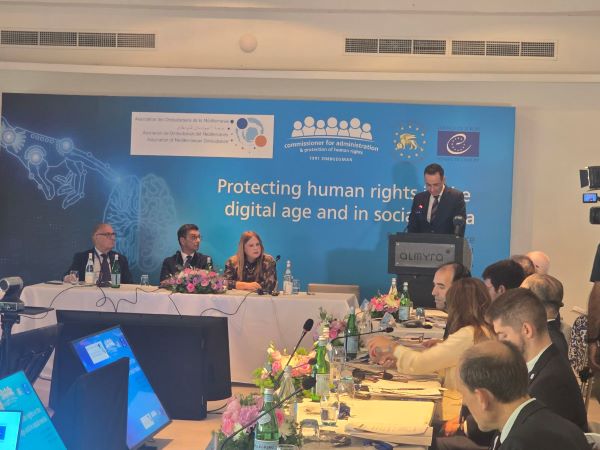Press Releases

26-09-2024 12:31
Speech of the Deputy Minister of Research, Innovation and Digital Policy of the Republic of Cyprus, Dr Nicodemos Damianou, at the Regional Conference “Protecting Human Rights in the digital age and in social media”
Dear Ombudsman οf Cyprus,
Dear President of Association of Mediterranean Ombudsmen (ΑΟΜ) and Human Rights Ombudsman of the Republic of Slovenia,
Dear Member of the Venice Commission in respect of Malta,
Distinguished guests,
Good morning and thank you all for joining us today as we address a matter of utmost relevance, urgency, and gravity. A warm welcome to our guests from abroad and sincere congratulations to the organisers for launching this extraordinary platform.
It was estimated that 20 minutes in the Metaverse – imagine yourself wearing your virtual reality (VR) headset navigating a virtual world as your avatar – generates 2 million data points. And assume that you purchased a virtual ticket using your crypto wallet, and you are in the Metaverse to watch the virtual concert of Ariana Grande. Who is the data controller in that case – and hence the entity responsible for compliance with privacy or communication laws? The Metaverse platform? The Crypto wallet provider? Or Ariana Grande? By the way, Ariana Grande did hold the third most popular virtual concert on the Metaverse (on Fortnite in particular), attended by more than 27 million unique viewers. If you put Artificial Intelligence (AI)-based avatars in the equation, things become too complicated.
Ladies and gentlemen,
We are in the midst of a technological revolution, brought on by the rapid development and exponential adoption of digital technologies. From chatting online, sharing content on social media or online shopping to reading the news or making a payment through your smartphone, digital interactions have dominated every facet of modern life. Technological advancements, such as AI, Internet of Things (IoT) and the metaverse, have resulted in better access to education and health, innovative solutions to major challenges, as well as new business models and ways to connect, learn, create and participate in society and the economy. Social media platforms have become vital tools for sharing ideas, fostering communities, and participating in democratic processes.
Yet, with these advances come significant challenges, and the need to ensure that digital transformation remains human-centric and rights-oriented. The digital age creates numerous tools, spaces, methods and opportunities for people to exercise and enjoy their individual and collective rights, but also new ways in which these can be infringed. Concerns, such as breaches of privacy and the spread of illegal and harmful content online, can diminish trust in governments, businesses, and the digital environment and undermine democratic principles.
Similarly, the scale, speed, and scope with which content grows online add a certain level of complexity to the matter. The amount of information available to the masses is incomprehensible, while social media platforms can sometimes become arenas for hate speech, abuse, discrimination, and disinformation, fuelling toxic behaviours and inciting violence. We all agree that the right to freedom of expression is a cornerstone of democracy and must be protected. However, our rights must be exercised responsibly. While we advocate for open discourse and the free exchange of ideas, we should also recognise the need to combat misinformation and build public trust.
Discussions over the past couple of years focus largely on AI and the advent of Generative AI (Gen AI) in particular. And even though AI holds significant potential to positively impact the lives of millions, it is also associated with significant risks that could undermine human rights. Primary concerns evolve around lack of transparency in the development and functioning of Gen AI systems, discriminatory algorithms, the origin and potential biases of the data sets used to train the AI models, data privacy breaches, cybersecurity vulnerabilities, and potential intellectual property infringements.
How do we protect ourselves against these challenges? As new technologies often outpace the policies that govern them, governments often find themselves unprepared, with regulatory and policy gaps creating the potential for these technologies to be used in ways that harm individuals or society as a whole. It is, therefore, our duty as policymakers to catch up with the fast-moving digital reality, and make sure we have the right policies and controls in place to ensure that fundamental human rights apply equally online and offline, and that everyone has the opportunity and the tools to be able to comprehend and fully exercise them.
We need to make digital investments for public good a priority.
To this end, the European Union (EU) has recently introduced the AI Act, the first ever comprehensive regulatory framework on AI worldwide, aimed at fostering trustworthy, human-centric AI solutions. Following a risk-based approach, the legislation sets clear requirements and obligations regarding AI development, deployment and use, so as to ensure AI systems respect fundamental rights, safety, democratic, and ethical principles.
Amidst redrafting our national AI strategy using a more applied approach, Cyprus is taking all necessary steps to ensure compliance with the AI Act. Our goal is to ensure we fully seize the potential of AI, while making sure it is used effectively and responsibly to benefit our society. Compliance includes the designation of a national Competent Authority within 12 months after the regulation’s entry into force –which was on 1 Aug 2024– while full application of the AI Act is planned after 36 months.
The EU also provides a comprehensive regulatory framework for digital services, primarily through the Digital Services Act (DSA) and the Digital Markets Act (DMA). These regulations aim to create a safer, fairer, and more transparent online environment for users, while also ensuring increased accountability and cross-border application. The DSA focuses on the obligations of digital service providers – online platforms, hosting services, social media, online marketplaces, and search engines, among others – to ensure user safety, protect fundamental rights and prevent illegal and harmful activities and content online. The DMA, on the other hand, focuses on fostering healthy competition in Europe’s digital market, by preventing unfair practices and defining the do’s and don’ts that the so-called gatekeepers – i.e. large digital platforms must comply with.
In addition, the General Data Protection Regulation (GDPR) remains a cornerstone of EU digital regulation. As government, and in compliance with GDPR provisions, we implement robust data protection regulations to ensure that personal information is handled with the highest levels of security and transparency. We are committed to fully enforcing these standards and holding those who violate them accountable.
Dear friends,
Human rights are the cornerstone of our societies, and they provide a guiding compass to address new technologies, not just in the way they are used but also in the way they are designed, developed, and deployed. The Internet and social media should not only reflect our shared values but also enhance them. As our online and offline lives become increasingly intertwined, we need to ensure technology is in the service of human well-being.
At the same time, and in addition to constructing a safe digital environment, we also need to bridge digital divides and ensure our efforts are inclusive. As we navigate the complexities of the digital landscape, we must be attentive to the needs of all individuals, including those who are marginalised or vulnerable. Ensuring equal access to digital resources and protecting the rights of every individual, regardless of their background, is fundamental to our mission. To that end, Cyprus was the first country in Europe to have achieved 100% population coverage with 5G, and we are now on track to deploy high-speed fibre optic connectivity across the island to be the first country in Europe with 100% population access to such connectivity by the end of 2025.
It is also of utmost importance for individuals to be able to develop cognitive, technical, and social skills and capacities that enable them to effectively access and critically analyse online content; to make informed decisions about which platforms or tools to use and how to use them; to understand the ethical implications of new technologies, and protect themselves in any way possible.
Around 50% of European citizens currently lack basic digital skills – same applies to Cyprus. That is why, as part of Europe’s Digital Decade, we focus our efforts on promoting digital literacy through targeted educational initiatives, as well as informational campaigns to raise awareness on the potential risks of operating in the online world.
To conclude, I would like to reiterate that the digital age presents both remarkable opportunities and significant responsibilities for governments and businesses worldwide. As Deputy Ministry of Digital Policy, we are committed to protecting human rights while advancing the digital transition. By working together – governments, technology companies, and society – we can build a digital environment that upholds our shared values and fosters a safe, respectful, and equitable space for all.
Thank you.
(GS/AS)
Relevant Press Releases

15-10-2024 13:48
Cyprus Signs MoU with Khazna, member of G42 group




